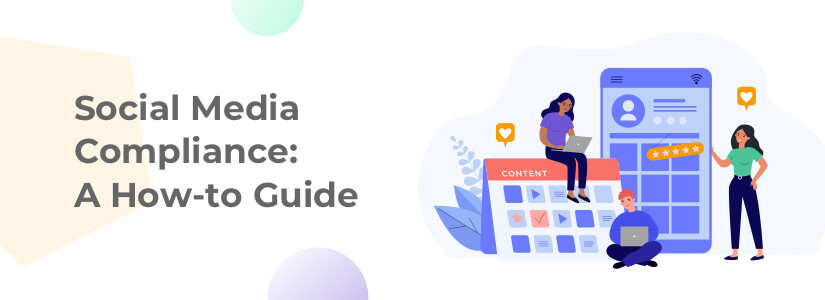The term “Social Media Compliance” has become increasingly significant in the fast-paced digital era. As businesses leverage social platforms to connect with audiences, they must navigate a complex regulatory landscape to ensure ethical and legal practices. Let’s delve into the nuances of social media compliance, understand its implications, requirements, and best practices.
Definition of Social Media Compliance

Social Media Compliance refers to the adherence of businesses and individuals to regulations governing their activities on social media platforms. This includes legal, ethical, and industry-specific guidelines.
Importance in the Digital Age
In an age where information travels at the speed of light, maintaining social media compliance is crucial. It establishes trust, protects users’ rights, and ensures fair competition.
The Regulatory Landscape
A. Overview of Social Media Regulations
Governments worldwide are enacting regulations to govern social media activities. These may include data protection laws, advertising standards, and rules against misinformation.
B. Legal Implications for Non-Compliance
Non-compliance can result in severe consequences, including legal actions, fines, and damage to reputation. Businesses need to stay informed and adapt to evolving regulations.
Key Compliance Requirements
A. Data Privacy and Protection
Protecting user data is paramount. Compliance involves obtaining consent, securing data, and transparently communicating data practices.
B. Advertising Standards
Businesses must adhere to advertising regulations, ensuring truthful and non-deceptive practices. This includes proper disclosure of sponsored content.
C. Transparency and Authenticity
Maintaining authenticity in social media interactions and providing transparent information is essential for compliance.
Industry-Specific Compliance
A. Healthcare and Pharmaceuticals
Healthcare organizations must navigate additional regulations, considering patient privacy and ethical marketing practices.
B. Financial Services
Financial institutions face stringent regulations to safeguard customers and maintain the integrity of financial information.
C. Education and Nonprofits
Educational institutions and nonprofits must balance their social media presence with ethical fundraising and communication practices.
Social Media Platforms’ Guidelines
A. Understanding Platform Policies
Each social media platform has its own set of guidelines. Businesses must be familiar with and adhere to these to avoid account suspension or removal.
B. Tips for Adhering to Guidelines
Regularly reviewing and adapting to platform guidelines is essential. This includes staying updated on changes and engaging in transparent communication with users.
Implementing a Social Media Compliance Strategy
A. Developing Policies and Procedures
Businesses should establish comprehensive social media policies, clearly outlining acceptable practices and consequences for non-compliance.
B. Employee Training and Awareness
Ensuring employees are educated about compliance is crucial. Regular training sessions can help mitigate risks.
C. Monitoring and Reporting Mechanisms
Implementing tools for monitoring social media activities and establishing reporting mechanisms can aid in identifying and addressing compliance issues promptly.
Challenges
A. Rapid Changes in Regulations
The dynamic nature of social media regulations requires businesses to stay agile and adapt quickly to changes.
B. Global Variations
Operating in a global context means navigating diverse regulations. Businesses must understand and comply with variations in different regions.
C. Balancing Innovation and Compliance
Staying innovative while adhering to compliance standards is a delicate balance. Businesses need strategies that foster creativity without compromising integrity.
Future Trends
A. Anticipated Regulatory Changes
Predicting future regulatory changes helps businesses proactively adjust their strategies to stay compliant.
B. Technological Solutions and Innovations
Emerging technologies, such as AI-driven compliance tools, can assist businesses in maintaining a proactive and effective compliance approach.
Tips for Businesses
A. Staying Informed
Regularly monitoring regulatory updates and industry trends ensures businesses are well-prepared for any changes.
B. Collaboration with Legal and Compliance Teams
Close collaboration with legal and compliance teams helps businesses navigate complex regulations effectively.
C. Regular Audits and Reviews
Regular audits of social media practices and reviews of compliance strategies ensure continuous improvement and adaptability.
Benefits of Social Media Compliance
A. Building Trust with Stakeholders
Compliance fosters trust with users, customers, and partners, establishing a positive brand image.
B. Enhancing Brand Reputation
Maintaining ethical practices on social media contributes to a positive brand reputation.
C. Long-Term Business Sustainability
Businesses prioritizing social compliance are better positioned for long-term success in the digital landscape.
Conclusion
Social Media Compliance is a multifaceted responsibility, requiring businesses to understand, adapt, and innovate within the regulatory landscape.
Proactive compliance is not just a legal necessity but a strategic advantage that can safeguard businesses from risks and contribute to their overall success.
Ready to take your social media compliance to the next level? Request a demo from AIM Technologies today!
FAQs
A. What is the role of social compliance?
- Social compliance ensures that businesses and individuals adhere to ethical, legal, and platform-specific guidelines in their online interactions.
B. How often should businesses update their compliance strategies?
- Regular updates are crucial, ideally aligning with changes in regulations or industry standards.
C. Are there industry-specific challenges in social compliance?
- Yes, different industries face unique challenges, such as patient privacy concerns in healthcare or financial regulations in the finance sector.
D. What happens if a business fails to comply with social media regulations?
- Consequences can include legal actions, fines, damage to reputation, and even account suspension or removal from platforms.
E. How can businesses prepare for future changes in social media compliance?
- Staying informed, leveraging technology, and maintaining a proactive mindset are key to preparing for future changes in social media compliance.




